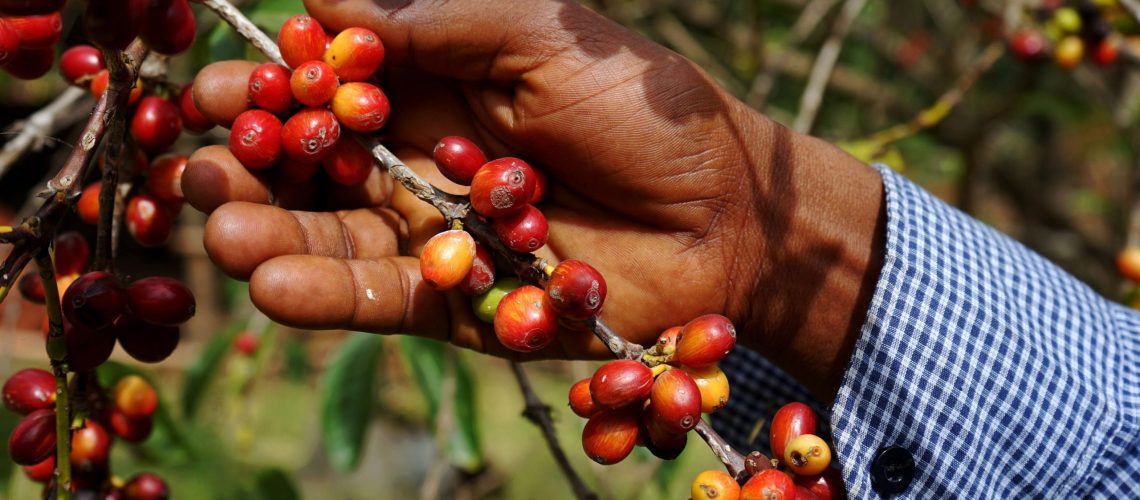Specialty coffee
In 2002, a number of farmer groups near the Nyungwe Forest in southwest Rwanda set up the coffee cooperative KOAKAKA. Step by step they expanded their organisation to include around 70 collection points where members bring their freshly picked berries, and two washing stations where the first steps of the process take place. It wasn’t long before KOAKAKA received the Fairtrade label. With support from the government and NGOs, and with the help of Fairtrade premiums, over the years they optimised their most important asset: the excellent quality of their arabica grown at high altitude. Speciality coffees are in great demand on the international market and in 2016 the organisation also won first prize in the Rwanda Cup of Excellence, an annual competition between coffee cooperatives.
KOAKAKA currently has 1300 members: 1000 men and 300 women. In addition to the provision of seeds, fertilisers and interest-free loans, the members also receive grants for health insurance and education.
Own marketing plan
In 2015, KOAKAKA applied for marketing support from the Trade for Development Centre. TDC coaches travelled to Rwanda for four modules over the course of 2016 and 2017. One thing that immediately came to light during the first session was the dependence on Rwashoscco, an umbrella organisation which KOAKAKA is also a shareholder of.
On behalf of its member cooperatives, Rwashoscco is responsible for everything to do with cupping (quality control), marketing and export. In the past, the managers at KOAKAKA knew very little about who bought their coffee or why they were losing customers. During the first session, therefore, a decision was made that they would create their own marketing plan, in consultation with Rwashoscco, and start prospecting themselves.
The finest coffee
The first hurdles that needed to be overcome were improved language skills in French and English for the managers of the cooperative, and a better internet connection for the office. In marketing speak, this is known as ‘working defensively on one’s own weaknesses’, which is a prerequisite if you also want to be able to work offensively to better highlight your own strengths. The sales story was built around the baseline ‘The finest coffee of Rwanda, special reserve’, with as a side story a special mention for Women’s Coffee, quality coffee grown exclusively by female members of the cooperative. This would interest a number of customers looking for ‘coffee with a story’.
Marketing coaching from TDC also includes a limited budget to spend on materials. This was put to good use at KOAKAKA: the logo was given a new look and the organisation took its place on the worldwide web with a website, Facebook page and LinkedIn account.
New customers
To make that strategy even more promising, in 2017 the cooperative also received UTZ and Rainforest Alliance certification to complement its Fairtrade label. A list was created of existing customers with growth margin and new coffee traders and roasters which they could approach. Samples were sent out and KOAKAKA also took part in international coffee trade fairs for the first time. Together, staff and coach analysed the sales prices which used to be negotiated by Rwashoscco.
“After the coaching, it became clear that – with a 69% increase in the sales price – this was where the biggest progress had been made”, concluded the TDC coaches Laura Karibanga and Josiane Droeghag. “New Japanese, European and Australian customers are proving that KOAKAKA is capable of building up relationships and that this is the path they need to keep following.”
Analysis and forecasting
In October 2017, a second TDC coach visited KOAKAKA for a module about Finance & Business Management. “When we went over the 2016 financial statements, it was immediately clear that the cooperative’s Executive Secretary and accountant had prepared well”, explains coach Maxime Bacq. “It became a ‘high-level’ lecture’.”
“ But then came the real work and we turned to tools which would give them better insight into the state of the organisation’s financial affairs. Many things were new, like a long-term overview of investments and depreciations or a calculation of the number of members required to make the planned third washing station cost-effective. Later on, an analysis of turnover and margins was carried out, as well as an adjusted 2017 budget and a forecast for 2018. Attention was also paid to the fines that the organisation pays each year to credit lenders, because the cycle of payments (to the farmers) and income (from the buyers) did not tally. The possibility of an extra loan was explored.”
“The strength of this intensive week was in the level of participation”, the coach concludes. “The staff had no prior knowledge of some of the tools, but they have adopted them fully. With these tables they can now carry on with both their analysis and forecasting.”
Project in figures
KOAKAKA approached the Trade for Development Centre for coaching in marketing (period 2016-2017) and in Finance & Business Management (end of 2017). Part of the coaching in marketing also included €15,000 support to develop concrete materials.


